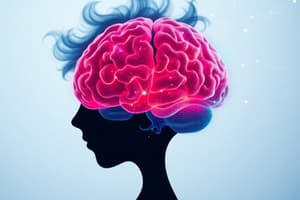Podcast
Questions and Answers
What are the two key processes that increase efficiency in brain development during adolescence?
What are the two key processes that increase efficiency in brain development during adolescence?
Pruning of neurons and myelination of nerve fibers
According to Piaget's Formal Operational Stage, what cognitive ability do adolescents develop?
According to Piaget's Formal Operational Stage, what cognitive ability do adolescents develop?
Ability to think abstractly and reason logically
What is the primary challenge adolescents face in terms of emotional regulation?
What is the primary challenge adolescents face in terms of emotional regulation?
Struggling to regulate emotions, leading to mood swings
According to Erikson's Psychosocial Theory, what is the central crisis that adolescents face during identity formation?
According to Erikson's Psychosocial Theory, what is the central crisis that adolescents face during identity formation?
What is the outcome of increased capacity for working memory in adolescents?
What is the outcome of increased capacity for working memory in adolescents?
Why are emotional experiences more intense during adolescence?
Why are emotional experiences more intense during adolescence?
What is the primary difference between foreclosure and moratorium identity statuses in exploring identities and roles?
What is the primary difference between foreclosure and moratorium identity statuses in exploring identities and roles?
How do peer relationships influence identity and behavior during adolescence?
How do peer relationships influence identity and behavior during adolescence?
What are the two primary aspects of parent-adolescent relationships during adolescence?
What are the two primary aspects of parent-adolescent relationships during adolescence?
What triggers the rapid physical growth and sexual maturation during puberty?
What triggers the rapid physical growth and sexual maturation during puberty?
What is the impact of brain development and hormonal changes on physical growth and maturation?
What is the impact of brain development and hormonal changes on physical growth and maturation?
What is the role of exploration and commitment in achieving a sense of self during adolescence?
What is the role of exploration and commitment in achieving a sense of self during adolescence?
Flashcards are hidden until you start studying
Study Notes
Cognitive Development
- Brain Development:
- Pruning of neurons and myelination of nerve fibers increase efficiency
- Prefrontal cortex, responsible for decision-making and impulse control, is still developing
- Piaget's Formal Operational Stage:
- Adolescents develop ability to think abstractly and reason logically
- Can consider multiple perspectives and hypothetical scenarios
- Information Processing:
- Capacity for working memory increases, enabling better problem-solving
- Adolescents can process more complex information and make connections between concepts
Emotional Development
- Emotional Regulation:
- Adolescents struggle with regulating emotions, leading to mood swings
- Brain development contributes to impulsivity and emotional reactivity
- Emotional Intensity:
- Emotional experiences are more intense due to hormonal changes and brain development
- Adolescents may be more prone to depression, anxiety, and emotional distress
Identity Formation
- Erikson's Psychosocial Theory:
- Adolescence is characterized by the crisis of "Identity vs. Role Confusion"
- Exploration of identities and roles helps form a sense of self
- Identity Statuses:
- Foreclosure: commitment to an identity without exploration
- Moratorium: exploration of identities without commitment
- Diffusion: lack of exploration and commitment
- Achievement: exploration and commitment to an identity
Social Development
- Peer Relationships:
- Peers become increasingly important, influencing identity and behavior
- Adolescents seek social support, validation, and belonging
- Parent-Adolescent Relationships:
- Conflict and negotiation are common as adolescents seek independence
- Parents' guidance and support remain crucial for development
Physical Development
- Puberty:
- Hormonal changes trigger rapid physical growth and sexual maturation
- Timing and pace of puberty vary among individuals
- Physical Changes:
- Body shape, size, and composition change dramatically
- Brain development and hormonal changes influence physical growth and maturation
Brain Development
- Pruning of neurons and myelination of nerve fibers increase efficiency in the brain
- Prefrontal cortex, responsible for decision-making and impulse control, is still developing during adolescence
Cognitive Development
- Adolescents develop ability to think abstractly and reason logically in Piaget's Formal Operational Stage
- Can consider multiple perspectives and hypothetical scenarios in this stage
- Capacity for working memory increases, enabling better problem-solving
- Can process more complex information and make connections between concepts
Emotional Regulation
- Adolescents struggle with regulating emotions, leading to mood swings
- Brain development contributes to impulsivity and emotional reactivity
Emotional Intensity
- Emotional experiences are more intense due to hormonal changes and brain development
- May be more prone to depression, anxiety, and emotional distress
Identity Formation
- Adolescence is characterized by the crisis of "Identity vs. Role Confusion" in Erikson's Psychosocial Theory
- Exploration of identities and roles helps form a sense of self
- Four identity statuses: Foreclosure, Moratorium, Diffusion, and Achievement
Social Development
- Peers become increasingly important, influencing identity and behavior
- Adolescents seek social support, validation, and belonging from peers
- Conflict and negotiation are common in parent-adolescent relationships as adolescents seek independence
- Parents' guidance and support remain crucial for development
Physical Development
- Puberty triggers rapid physical growth and sexual maturation due to hormonal changes
- Timing and pace of puberty vary among individuals
- Body shape, size, and composition change dramatically during adolescence
- Brain development and hormonal changes influence physical growth and maturation
Studying That Suits You
Use AI to generate personalized quizzes and flashcards to suit your learning preferences.




